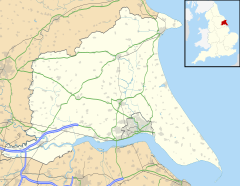Nunkeeling
 From Wikipedia the free encyclopedia
From Wikipedia the free encyclopedia
| Nunkeeling | |
|---|---|
Location within the East Riding of Yorkshire | |
| OS grid reference | TA142496 |
| • London | 165 mi (266 km) S |
| Civil parish | |
| Unitary authority | |
| Ceremonial county | |
| Region | |
| Country | England |
| Sovereign state | United Kingdom |
| Post town | DRIFFIELD |
| Postcode district | YO25 |
| Dialling code | 01964 |
| Police | Humberside |
| Fire | Humberside |
| Ambulance | Yorkshire |
| UK Parliament | |
Nunkeeling is a hamlet in the East Riding of Yorkshire, England. It is situated approximately 4 miles (6.4 km) north-west of the town of Hornsea and 3 miles (5 km) south of Beeford.
Nunkeeling forms part of the civil parish of Bewholme.

St Mary Magdalene and St Helena Church was built c. 12th century. In 1810 it was rebuilt and is now in ruins. In 1972 Pevsner noted that the church was "full of trees". Effigies from the church were removed to Hornsea.[1][2] In November 1985 the remains were designated as Grade II and is now recorded in the National Heritage List for England, maintained by Historic England.[3]
History[edit]
Nunkeeling is noted in the Domesday Book in 1086 as Keeling (spelled Chilinghr[4]) in Holderness Wapentake.[5] The listed lord of the manor, Drogo de la Beuvrière, fled England in 1087 following the death of his wife. So William the Conqueror granted the manor to his sister Adelaide as part of the Lordship of Holderness, and her husband Odo became Earl of Holderness by right of his wife.
The -ing suffix was used in Old English to form derivatives of masculine nouns and indicates 'belonging to',[6] so the land at some time in its Anglo-Saxon past likely belonged to descendants of a man who spoke Old Norse, whose name was Latinised as Chil and in Anglicised as Keel.
The name of the hamlet changed from Keeling to Nunkeeling [7] due to the fame of Nunkeeling Priory, built by Agnes de Arches during the reign of King Stephen for Benedictine nuns. Eventually the priory owned most of the surrounding land but declined into poverty.
In 1823 Nunkeeling was a civil parish in the Wapentake and Liberty of Holderness. Lord of the manor in 1823 was Harrington Hudson of Bessingby. Population at the time, which included Bewholme, was 243, with occupations including four farmers. A private asylum existed in the village.[8]
References[edit]
- ^ Pevsner, Nikolaus; The Buildings of England. Yorkshire: York and the East Riding p. 321; Penguin (1972); reprinted 1975, Pevsner Architectural Guides. ISBN 0140710434
- ^ Church of Saint Mary Magdalene and Saint Helena, Bewholme; British Listed Buildings. Retrieved 18 April 2012
- ^ Historic England. "Church of Saint Mary Magdalene and Saint Helena (1249440)". National Heritage List for England. Retrieved 29 April 2013.
- ^ National Archives: Reading Domesday entries. Retrieved 15 February 2020.
- ^ Open Domesday: (Nun)keeling. Retrieved 15 February 2020.
- ^ Old English Wiktionary: -ing, accessed February 2020.
- ^ Plea Rolls of the Court of Common Pleas; year: 1452; National Archives; CP40/764; image seen at: http://aalt.law.uh.edu/AALT3/H6/CP40no764/bCP40no764dorses/IMG_1832.htm; first entry, with Philip Wentworth as the plaintiff & Robert Ouste, chaplain, as a defendant
- ^ Baines, Edward (1823). History, Directory and Gazetteer of the County of York. p. 374.
- Gazetteer — A–Z of Towns Villages and Hamlets. East Riding of Yorkshire Council. 2006. p. 9.
External links[edit]
 Media related to Nunkeeling at Wikimedia Commons
Media related to Nunkeeling at Wikimedia Commons- Nunkeeling in the Domesday Book
